PETER TOSH / “Get Up, Stand Up”
Despite a lengthy and successful solo career after leaving The Wailers, Peter Tosh’s best known song is almost certainly “Get Up, Stand Up,” a record he first recorded with The Wailers and one that casual fans probably think of as a Bob Marley song. While “Get Up, Stand Up,” is co-credited to Bob (probably for the instrumental half of the song), the lyrics sound like 100% Peter. In November of ‘07, in an attempt to distinguish what the three members of the Wailers brought to the group, I described them this way:
Bob Marley was the theorist, the thinker, the leader; Peter Tosh was the lightning rod, the stepping razor, the warrior; but it was Bunny Wailer, the pacifist, the farmer, the hill-dwelling Rasta, who had the prettiest voice.The lyrics of “Get Up, Stand Up” are a great example of what I meant about Peter. While Bob often (though not always) framed his political commentary in metaphor, Peter kept his words raw and uncut. He was sarcastic, didactic and almost always got right to the point. He disdained hypocrisy in all its guises whether personal, political, religious or social; he didn’t care who the truth (as he saw it) offended; and, he was afraid of nothing. Not just in nickname, but in word and action, he was indeed the ‘Stepping Razor.’
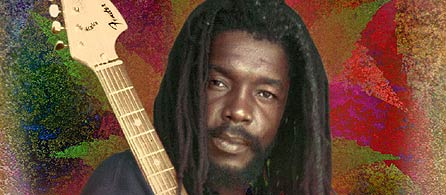 Let’s take a closer look at Peter’s lyrics for “Get Up, Stand Up.” Given the chorus (“get up, stand up / stand up for your rights”), it’s easy to assume that “Get Up” is a Black Power song, a song urging black people to assert their civil rights. I don’t think that interpretation is necessarily wrong, but it is incomplete. What “Get Up, Stand Up” is actually about is one of the key differences between Christianity and Rastafari, that being the existence of an omniscient God and the notion of a blissful, perfect afterlife.
Peter’s God is not a diety. He's a living man, Haile Selassie I (“almighty God is a living man”). Peter's idea of heaven doesn't involve angels or the sky. His idea of heaven is the here and now (“if you know what life is worth, you will look for yours on earth”). Peter isn’t going to pick and choose between various Christian denominations or beliefs (“we’re sick and tired of your -ism/schism game”) and he’s not falling for the fancy talk of preachers (“you can fool some people sometimes, but you can’t fool all the people all the time”). He’s also less than impressed by the big churches and sparkling robes of the religious elite (“not all that glitters is gold”). And, he won’t wait passively for his reward in the afterlife (“most people think great God will come from the sky, take away everything and make everybody feel high”). Instead, he’ll do whatever he can to improve his life and the life of his people right here, right now on earth (“now you see the light, stand up for your rights”).
Let’s take a closer look at Peter’s lyrics for “Get Up, Stand Up.” Given the chorus (“get up, stand up / stand up for your rights”), it’s easy to assume that “Get Up” is a Black Power song, a song urging black people to assert their civil rights. I don’t think that interpretation is necessarily wrong, but it is incomplete. What “Get Up, Stand Up” is actually about is one of the key differences between Christianity and Rastafari, that being the existence of an omniscient God and the notion of a blissful, perfect afterlife.
Peter’s God is not a diety. He's a living man, Haile Selassie I (“almighty God is a living man”). Peter's idea of heaven doesn't involve angels or the sky. His idea of heaven is the here and now (“if you know what life is worth, you will look for yours on earth”). Peter isn’t going to pick and choose between various Christian denominations or beliefs (“we’re sick and tired of your -ism/schism game”) and he’s not falling for the fancy talk of preachers (“you can fool some people sometimes, but you can’t fool all the people all the time”). He’s also less than impressed by the big churches and sparkling robes of the religious elite (“not all that glitters is gold”). And, he won’t wait passively for his reward in the afterlife (“most people think great God will come from the sky, take away everything and make everybody feel high”). Instead, he’ll do whatever he can to improve his life and the life of his people right here, right now on earth (“now you see the light, stand up for your rights”).
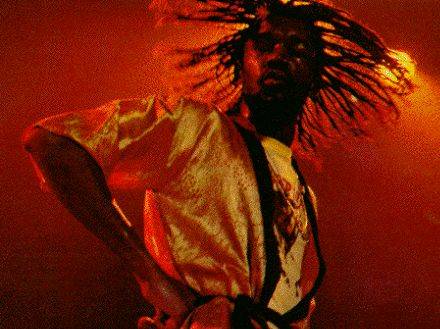 Seen in this way, “Get Up, Stand Up” is as much a religious (or anti-religious, as it were) statement as it is a political one. Here are some interesting covers, near-covers and versions of the “get up, stand up” theme:
>1. The Abyssinians – “Declaration Of Rights” – From Satta Massagana (Heartbeat, 1976)
“Get up and fight for your rights, my brother / Get up and fight for your rights, my sister.” This classic Abyssinians record is sometimes mentioned as a precursor to Bob and Peter’s song. (The version here is a re-recording of a song the Abyssinians first recorded several years earlier.)
As in the case of the more famous “Get Up, Stand Up,” the Abyssinians’ record is a call for the downtrodden to throw off their bondage and fight for their rights. If you’ve read the second part of Genesis and the first part of Exodus, these lyrics will sound familiar.
>2. The Wailers – “Get Up, Stand Up” – From Burnin’ (Tuff Gong/Island, 1973)
The classic original version with lead vocals by Bob and an incendiary ‘rap’ by Peter.
>3. Toots & The Maytals – “Get Up, Stand Up” – Originally from Pass The Pipe (Island, 1978); Available on Time Tough: The Anthology (Island, 1996)
In the world of reggae, it’s very common for artists to remake other artists’ songs, make little changes and then call the resulting music their own new song. Here, the legendary Jamaican singer Toots Hibbert takes the opposite approach. Other than the title, Toots’ “Get Up, Stand Up” seems to have little in common with the famous Wailers record, but on the Maytals’ Pass The Pipe LP, this song is credited to Bob and Peter.
>4. Peter Tosh –“Get Up, Stand Up” – From Equal Rights (CBS, 1977)
My favorite version of “Get Up, Stand Up.” Probably because it’s the one I remember hearing the most when I was a kid. Sly & Robbie contribute the lean, electric-sounding riddims and Peter one-ups Bob with a terse, seething performance of his own lyrics.
Seen in this way, “Get Up, Stand Up” is as much a religious (or anti-religious, as it were) statement as it is a political one. Here are some interesting covers, near-covers and versions of the “get up, stand up” theme:
>1. The Abyssinians – “Declaration Of Rights” – From Satta Massagana (Heartbeat, 1976)
“Get up and fight for your rights, my brother / Get up and fight for your rights, my sister.” This classic Abyssinians record is sometimes mentioned as a precursor to Bob and Peter’s song. (The version here is a re-recording of a song the Abyssinians first recorded several years earlier.)
As in the case of the more famous “Get Up, Stand Up,” the Abyssinians’ record is a call for the downtrodden to throw off their bondage and fight for their rights. If you’ve read the second part of Genesis and the first part of Exodus, these lyrics will sound familiar.
>2. The Wailers – “Get Up, Stand Up” – From Burnin’ (Tuff Gong/Island, 1973)
The classic original version with lead vocals by Bob and an incendiary ‘rap’ by Peter.
>3. Toots & The Maytals – “Get Up, Stand Up” – Originally from Pass The Pipe (Island, 1978); Available on Time Tough: The Anthology (Island, 1996)
In the world of reggae, it’s very common for artists to remake other artists’ songs, make little changes and then call the resulting music their own new song. Here, the legendary Jamaican singer Toots Hibbert takes the opposite approach. Other than the title, Toots’ “Get Up, Stand Up” seems to have little in common with the famous Wailers record, but on the Maytals’ Pass The Pipe LP, this song is credited to Bob and Peter.
>4. Peter Tosh –“Get Up, Stand Up” – From Equal Rights (CBS, 1977)
My favorite version of “Get Up, Stand Up.” Probably because it’s the one I remember hearing the most when I was a kid. Sly & Robbie contribute the lean, electric-sounding riddims and Peter one-ups Bob with a terse, seething performance of his own lyrics.
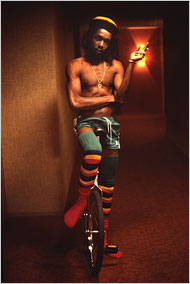 I do remember Tosh talk. The rumble of his smoky voice that was steel strong in his declarations—he didn't just opine, he declared. His unicycle was in his room. And of course he had shades on—or at least that’s what I remember.
About Bob, if I recall correctly, Tosh’s stance was somewhere east (not quite) of bitter because of Bob’s celebrity status and the same that eluded Tosh, and well south (definitely) of resignation realizing Babylon would never recognize. Tosh was not unware: he had a following and more than a modicum of fame, but he was also aware he certainly would never garner the fortune (such as it were) of commercial success. Here was a giant wide awake to his predicament while the system was blissfully sleeping on him.
Tosh didn’t have to say it—it was obvious (to both of us), if this had been Bob’s tour he would not be housed in a one-star hotel.
I don’t remember any of the details of what we talked about.
What is unforgettable was this Jamaican brother’s demeanor. Had he been born in the good ole U.S. of A., he undoubtedly would have been encouraged to be a basketball player and probably would have ended up a rapper, or both. I wonder, would his fire have been quenched (or extinguished) by the materialism that America offers us instead of justice and equal rights? Would Tosh forget his roots while reaching for the brass ring?
The more I think about it the less I have to speculate about it because Tosh’s history with the Wailers makes it clear: him no play second fiddle, him no fiddle at all while Rome/Paris burns. Moreover, Tosh’s murder also makes clear an even more dangerous truth.
I am sure that the Biblical warning "Live by the sword, die by the sword" is often applied to Tosh but I think there is a deeper truth there: poverty is a motherfucker and capitalism kills! Greed is deadly especially when practiced by the poor on one another—most of us have only to look out our windows to understand that or at least look at the neighborhoods where we used to live.
Legally, we allegedly have our equal rights but for sure there’s no justice. Tosh would have recognized that and would have sung a song that would not let us forget.
I do remember Tosh talk. The rumble of his smoky voice that was steel strong in his declarations—he didn't just opine, he declared. His unicycle was in his room. And of course he had shades on—or at least that’s what I remember.
About Bob, if I recall correctly, Tosh’s stance was somewhere east (not quite) of bitter because of Bob’s celebrity status and the same that eluded Tosh, and well south (definitely) of resignation realizing Babylon would never recognize. Tosh was not unware: he had a following and more than a modicum of fame, but he was also aware he certainly would never garner the fortune (such as it were) of commercial success. Here was a giant wide awake to his predicament while the system was blissfully sleeping on him.
Tosh didn’t have to say it—it was obvious (to both of us), if this had been Bob’s tour he would not be housed in a one-star hotel.
I don’t remember any of the details of what we talked about.
What is unforgettable was this Jamaican brother’s demeanor. Had he been born in the good ole U.S. of A., he undoubtedly would have been encouraged to be a basketball player and probably would have ended up a rapper, or both. I wonder, would his fire have been quenched (or extinguished) by the materialism that America offers us instead of justice and equal rights? Would Tosh forget his roots while reaching for the brass ring?
The more I think about it the less I have to speculate about it because Tosh’s history with the Wailers makes it clear: him no play second fiddle, him no fiddle at all while Rome/Paris burns. Moreover, Tosh’s murder also makes clear an even more dangerous truth.
I am sure that the Biblical warning "Live by the sword, die by the sword" is often applied to Tosh but I think there is a deeper truth there: poverty is a motherfucker and capitalism kills! Greed is deadly especially when practiced by the poor on one another—most of us have only to look out our windows to understand that or at least look at the neighborhoods where we used to live.
Legally, we allegedly have our equal rights but for sure there’s no justice. Tosh would have recognized that and would have sung a song that would not let us forget.
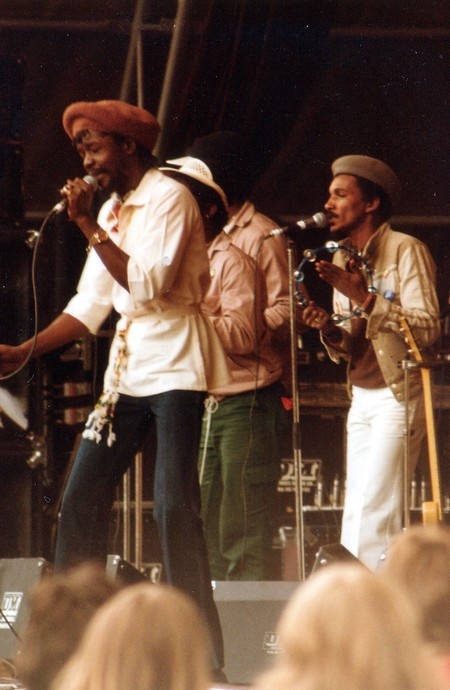 Mtume, I realize you are dealing with “Get Up, Stand Up" and covers thereof but allow me to drop one of my other favorite of Tosh’s songs, his pan-African anthem simply called “African.”
“No mind your nationality/you’ve got the identify.” The limited gender politics notwithstanding, and the limits of racial essentialism understood, what is significant about Tosh’s proclamation is that he urged us to move beyond colonial imposed differences among us. Whether those differences were political, religious or even racial ("if your ‘plexion high, or if your ‘plexion low, if your ‘plexion in between, you are an African"), regardless, we had a commonality.
Of course, in the 21st century, the greatest limitation on the realization of pan-anything is the corruption and exploitation of global capitalism. While “African” does not address that, the song is nevertheless an important step toward unity.
The version of “African” in the jukebox is from a 1978 concert in Boulder, Colorado that is not commercially available. Enjoy.
Mtume, I realize you are dealing with “Get Up, Stand Up" and covers thereof but allow me to drop one of my other favorite of Tosh’s songs, his pan-African anthem simply called “African.”
“No mind your nationality/you’ve got the identify.” The limited gender politics notwithstanding, and the limits of racial essentialism understood, what is significant about Tosh’s proclamation is that he urged us to move beyond colonial imposed differences among us. Whether those differences were political, religious or even racial ("if your ‘plexion high, or if your ‘plexion low, if your ‘plexion in between, you are an African"), regardless, we had a commonality.
Of course, in the 21st century, the greatest limitation on the realization of pan-anything is the corruption and exploitation of global capitalism. While “African” does not address that, the song is nevertheless an important step toward unity.
The version of “African” in the jukebox is from a 1978 concert in Boulder, Colorado that is not commercially available. Enjoy.
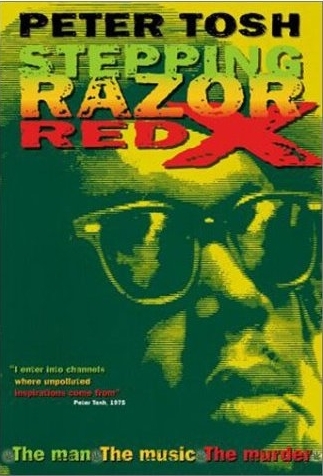 There is a brilliant documentary on the life of Peter Tosh constructed around oral journals kept on cassette tapes. I strongly recommended Peter Tosh Stepping Razor: Red X.
—Kalamu ya Salaam
There is a brilliant documentary on the life of Peter Tosh constructed around oral journals kept on cassette tapes. I strongly recommended Peter Tosh Stepping Razor: Red X.
—Kalamu ya Salaam
This entry was posted on Monday, August 11th, 2008 at 2:35 am and is filed under Cover. You can follow any responses to this entry through the RSS 2.0 feed. You can leave a response, or trackback from your own site.
3 Responses to “PETER TOSH / “Get Up, Stand Up””
September 5th, 2008 at 8:28 pm
I’m 45, from England living in the US with five fine strong talented and beautiful sons, two are rappers, one who never follows anyones path but is own and two younger ones that dred their hair and love all of Peter’s music. I have a tatoo of something he said on my back, he said “Peace is the diploma you receive at the cemetary” Profound and very true. I loved him as a child, a teenager and still now as a woman. Coming up it was all about Marley and it still is but not to me. As long as we tell our children about Peter then he will always be alive.
March 19th, 2011 at 1:28 pm
Peter TOsh was and is my hero. I saw him live. I live by his presence and personality. He was one of the world’s great singers/philosophers. When he died, reggae died. There will never be another like him. Honesty, straight to the point and no bullshit – that was Peter Tosh. Long live the Bush Doctor – my hero.
Leave a Reply
| top |